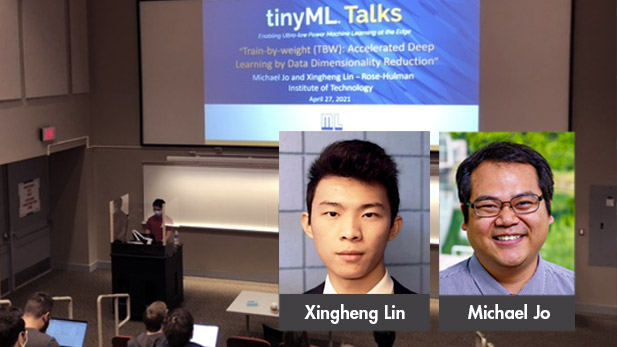Undergraduate Presents Machine Learning Work in tinyML Webcast Series and Gives Guest Lecture
Thursday, May 13, 2021

Computer engineering major Xingheng Lin presented his work with Assistant Professor Michael Jo to the tinyML community and ECE497-Embedded Machine Learning simultaneously.
Computer engineering major Xingheng Lin and Assistant Professor of Electrical and Computer Engineering Dr. Michael Jo recently presented their work as part of the tinyML webcast series. A consortium located in California, tinyML is focused on connecting academia and industry to make an impact in machine learning (tinyML) society. Their presentation can be viewed by clicking here. The pair’s method showed approximately 18 times faster training and testing speed with 1% accuracy loss by aggressively reducing the data size by combining linear and non-linear classifiers.
At the same time Lin presented to the tinyML community, he also presented to the ECE497-Embedded Machine Learning class. Lin also serves as a grader and teaching assistant in that class.
“I am very proud of Lin, as he is probably one of the only undergraduate students who has presented in this talk series,” says Professor Jo. “Most of the speakers are university professors or experienced engineers at prestigious companies.”
Xingheng Lin’s primary research interests are principal component analysis-based machine learning and deep learning acceleration. Additionally, the senior has applied his knowledge to work on pattern recognition of rapid saliva COVID-19 test response in collaboration with 12-15 Molecular Diagnostics.
“Although the pandemic forced us to move professional workshops and conferences to virtual or remote format, this opened up a special professional development opportunity for Lin to present his work to his peers,” says Professor Jo. “This was also a special opportunity for ECE497 students to watch their peer present cutting edge research project results in a professional setting.”
Lin’s work will continue to be shared with peers as the technology he presented will be added to the current ECE497-Embedded Machine Learning course.
“I want to thank Professor [Tina] Hudson for her advice on bringing this idea into reality and Professor [Mario] Simoni for sharing this presentation with the department,” says Professor Jo. “I was thrilled after seeing many students excited by the professional presentation format and the Q&A after the talk. TinyML committee members were also excited to have a live audience for the first time since they initiated the webcast series, and I believe we showed off what Rose is like.”
At the same time Lin presented to the tinyML community, he also presented to the ECE497-Embedded Machine Learning class. Lin also serves as a grader and teaching assistant in that class.
“I am very proud of Lin, as he is probably one of the only undergraduate students who has presented in this talk series,” says Professor Jo. “Most of the speakers are university professors or experienced engineers at prestigious companies.”
Xingheng Lin’s primary research interests are principal component analysis-based machine learning and deep learning acceleration. Additionally, the senior has applied his knowledge to work on pattern recognition of rapid saliva COVID-19 test response in collaboration with 12-15 Molecular Diagnostics.
“Although the pandemic forced us to move professional workshops and conferences to virtual or remote format, this opened up a special professional development opportunity for Lin to present his work to his peers,” says Professor Jo. “This was also a special opportunity for ECE497 students to watch their peer present cutting edge research project results in a professional setting.”
Lin’s work will continue to be shared with peers as the technology he presented will be added to the current ECE497-Embedded Machine Learning course.
“I want to thank Professor [Tina] Hudson for her advice on bringing this idea into reality and Professor [Mario] Simoni for sharing this presentation with the department,” says Professor Jo. “I was thrilled after seeing many students excited by the professional presentation format and the Q&A after the talk. TinyML committee members were also excited to have a live audience for the first time since they initiated the webcast series, and I believe we showed off what Rose is like.”